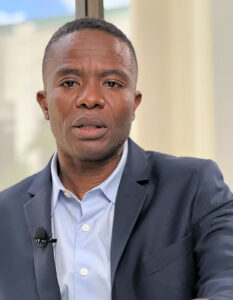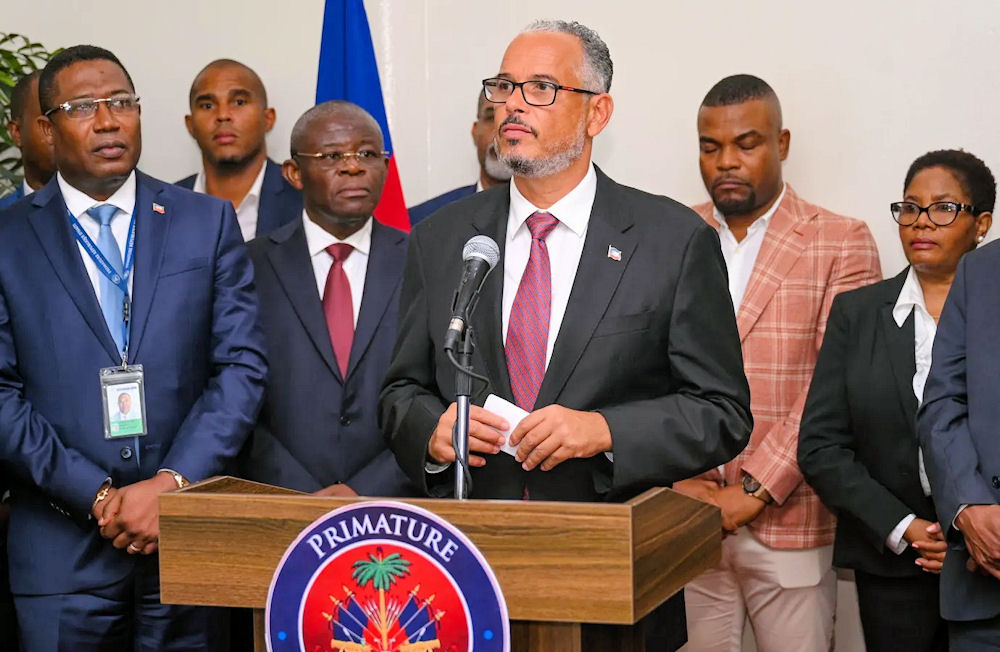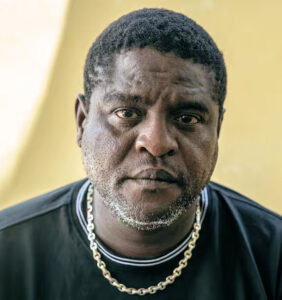
(Français)
Erik Prince, 56, the founder of several mercenary companies beginning with the now rebranded Blackwater, might have Washington’s backing for his mercenary operations in Haiti. Or he might just be pretending that he does.
The latter is what his former collaborator says. Haitian-American Rod Joseph, 47, is a U.S. Army veteran, a U.S. Senate candidate for Florida in 2024, and the owner of the People’s Choice Security & Training company in Orlando, FL. Joseph says that he was arranging with Prince earlier this year to train Haiti’s police officers, until they had a falling out.
“I blew the whistle on Prince,” Joseph told Haïti Liberté. “Prince told me he had a gig from the Pentagon. But when I called the Pentagon, it was a lie… I told him that my goal was to train the police, but then in March, he called me to say that the mission had changed, because it was going to take him two years to train the police and then to establish security.”

Joseph says Prince told him that he had decided to turn to mercenaries instead of police training. “That’s when I told him that I’m going to go public,” Joseph said, resulting in a May 28, 2025 story in the New York Times.
After the article, “he cursed me and threatened me,” Joseph said. “I cursed him back. I’m not talking to him now. Haiti is at stake. Haiti’s security is very important to me.”
Contradictory Accounts
On Aug. 14, Reuters reported, based on an interview with Prince, that he had secured “a 10-year deal with Haiti to fight the country’s criminal gangs and then take a role in restoring the country’s tax-collection system.”
Prince told Reuters that his new mercenary brand, Vectus Global, “would be involved in designing and implementing a program to tax goods imported across Haiti’s border with the Dominican Republic once the security situation is stabilized.”
The next day, Prince said that he had secured an agreement with Haiti’s unpopular and unelected Transitional Presidential Council (CPT) to deploy nearly 200 mercenaries into Haiti to target so-called “gangs,” as Haiti’s armed neighborhood groups are branded by the U.S. government and mainstream media.
A few days later, the former interim CPT president Fritz Alphonse Jean denied that there was any 10-year contract with Vectus Global. He told Haitian media that “no one in my office is aware of this contract.”
“The prospect of a long-term contract signed by the transitional authorities would in itself constitute a kind of challenge to state institutions,” Jean said, implying that such a deal could only be signed by an elected president.
On the same day, Haiti’s Finance Minister Alfred Métellus said: “There is currently no contract with a foreign security company,” effectively denying Prince’s claim.
“Prince is telling the truth,” Joseph said. “The contract was signed in April. Some government officials [like Jean] are in the dark. The CPT knows nothing about the contract. It’s all being done by the Prime Minister [Alix] Didier Fils-Aimé [whom the CPT appointed in November 2024]. He hired Prince… [and] offered Prince the job to secure ports, airports, borders, and the DGI tax office in order for Prince to help him maintain power after Feb. 7.”

“It’s a clandestine deal,” Joseph said. “Fils-Aimé gave $45 million up front, and then promised $85 million a year for 10 years.”
Joseph said that Métellus may know the deal is signed but “is also corrupt” because “they want to stay in power. Fils-Aimé doesn’t trust the police, and he wanted the insurance that the mercenaries can secure him, and then he can form a government and remain prime minister.”
The CPT’s mandate ends on Feb. 7, 2026, at which time it is supposed to dissolve.
Evergreen to Manage, Vectus to Secure
Joseph said that Fils-Aimé also signed a contract in April with Evergreen Trading Systems Limited to “manage the customs administratively, while Prince will do the security.”
Press reports and government officials say that the deal with Evergreen is still pending.
Haiti Libre reported to have information that Evergreen Trading System Limited is “expected to be awarded a 10 year contract” to “modernize customs and border services.”
Le Nouvelliste had a similar report with a headline that the pending deal was “Erik Prince’s Proposed Customs and Border Modernization Contract.”
Métellus said that “currently, the state exercises almost no control over products entering through the Malpasse border” near Jimani, Dominican Republic. There are four official crossing points between the neighboring countries.
“While it is true that we are examining several options to strengthen our security and customs infrastructure as well as our capacity to combat transnational crime, there is, to date, no contract in progress with anyone,” Métellus clarified.

Curiously, despite numerous press reports, there appears to be no website for “Evergreen Trading Systems Limited” and the only website that seemed a close match, Evergreen Trading Systems or ETS, appears to be non-functional,
Such mysteries along with the contradictory claims made by Prince and the two Haitian officials reflects the ongoing dysfunction within the CPT.
Prince’s role in setting up Haiti’s weaponized drone program was only revealed by The New York Times two months after it began, revealing that there is no transparency in the dealings between Prince and some part of the Haitian government.
Joseph said there is another government contract pending under which Gilbert Bigio, Haiti’s richest businessman, would “charge people $15,000 per container” coming into the Port-au-Prince port, which a Bigio Group subsidiary, Haitian Port Authority (HPA), administers. “The Haitian government gets $15″ per container under that deal, Joseph said, and Prince’s Vectus Global again would provide security.
Erik Prince: Haiti “cannot run itself”
Prince hopes to implement plans he outlined last year in an episode of his Off the Leash podcast, posted on Mar. 12, 2024.
He explained that, in early 2023, he was approached by then Prime Minister Ariel Henry’s lawyer. Henry was seeking assistance to clear out “gangs,” specifically the Revolutionary Forces of the G9 Family and Allies (FRG9), a coalition of anti-crime armed neighborhood committees with a revolutionary program.
Prince said Henry’s goal was to lower the cost of diesel fuel, which had quadrupled after the Haitian government removed state fuel subsidies in September 2022, igniting a nationwide uprising and prompting the seizure of the capital’s largest fuel port – Varreux – by the FRG9 as part of the protest.
Prince explained that he had a “package ready to go” for a “proper counter-gang squad.”
“I was going to staff it with Canadian Special Forces from Quebec” because “they understand the Western way of policing [and] they speak French,” he explained. “They would have been an advise, assist, [and] mentor role attached to 40 to 50 young Haitian police officers that would have been trained to provide them good intelligence, a little bit of drone capability, maybe one helicopter, and we could have that unit could have made very quick work of those gangs.”
Prince said that Haiti needs “to put one person in charge and clean that place up, and rule with an iron fist.”
Prince’s plan to disperse weaponized drones in Haiti to target “gang” leaders has already been implemented. It remains to be seen whether he can recruit enough Canadians in Quebec who have the proper training for his planned “counter-gang squad.”
Joseph said that Prince won’t be able to recruit 200 contractors “because he doesn’t pay people… He’ll probably give you only $1,500 per day… The going rate is at least $3,500 per day.” He said that Prince will now try to recruit “in country” (i.e. Haiti) from former soldiers and police officers.
At least, Prince is honest, making it clear in the interview that he does not seek to restore democracy in Haiti. Instead, he said that Haiti needs “to put one person in charge and clean that place up, and rule with an iron fist.”
Haiti “cannot run itself” and “the country would be better off being run by the United Fruit Company or Dole Pineapple,” Prince opined.
Clearly, Prince is not shy about advocating for outright colonial policies and U.S. imperialism in the Global South. In another episode of Off the Leash posted about a month earlier, Prince said “it’s time for us to just put the imperial hat back on, to say, ‘we’re going to govern those countries.’”
“You can say that about pretty much all of Africa; they’re incapable of governing themselves,” Prince continued, later adding that his assessment also applies to Latin America.
Private military contractors and the Global Fragility Act
Until now, the Trump administration has offered a haphazard mix of policies in Haiti. But Prince’s growing role suggest that Trump and Secretary of State Marco Rubio may be seeking to outsource – perhaps clandestinely – the U.S. military response in Haiti to mercenaries, as was done in Iraq with disastrous consequences.
Since Ariel Henry’s lawyer spoke to Prince in 2023, the FRG9 merged with a rival coalition named the G-Pèp to form the Viv Ansanm coalition, which in turn drove Henry from power on Feb. 29, 2024. The Viv Ansanm has now constituted itself as a political party and constantly petitions the CPT for dialogue.
Trump and Rubio’s declaration that they intend to “make foreign policy great again” has, in Haiti, only resulted in some half-steps so far such as classifying Viv Ansanm a “terrorist” group, diplomatically pushing the Organization of American States (OAS) to send an intervention force, and detaining Haitian oligarch Reginald Boulos.

But to bring about the changes that they was to see in Haiti, they will need to get “boots on the ground.”
Washington’s policy in Haiti over the past five years was to find a way to implement there the 2019 Global Fragility Act (GFA), under which the Pentagon, State Department, and USAID would become Haiti’s shadow government.
But in the second Trump administration, it is unclear whether the GFA will continue to be the long-term framework for Washington’s foreign policy in Haiti, at least as originally formulated.
The GFA, passed under the first Trump administration with full bi-partisan support, is currently awaiting reauthorization under bipartisan legislation introduced in April by House Foreign Affairs Committee Chairman Michael McCaul (R-TX) and Rep. Sara Jacobs (D-CA).
Rubio signaled that he supports the GFA during his nomination hearing before the Senate Committee on Foreign Relations, while NATO’s Atlantic Council, as well as the U.S. foreign policy flagship think-tank, the Council on Foreign Relations (CFR), continue to endorse it, reflecting the establishment’s continued support.
However, with the U.S. Agency for International Development (USAID), one of the GFA’s main actors, now dismantled by Trump, the program’s future remains unclear.
The GFA’s purpose is to protect U.S. interests in “fragile states,” including, but not limited to, access to raw materials. The act was framed by its proponents as “an opportunity to drive the necessary change” that would prevent “adversaries such as China and Russia to expand their influence.”
The GFA is underpinned by the “United States Strategy to Prevent Conflict and Promote Stability” (SPCPS). The SPCPS’s central pillar is for the Pentagon to provide 10 years of “security assistance” (i.e. U.S. troops) to GFA partners.
These 10-year military deployments are at the core of the GFA’s goals of maintaining control over U.S. neo-colonies while keeping Russia and China at bay.
Although Washington might want to deploy the GFA in Haiti, the country has no elected government to sign a deal for U.S. “security assistance.” Haiti has not had an election in nine years. Prince’s role appears to be to stabilize Port-au-Prince so that the CPT can organize elections.
However, it appears very unlikely that, when the CPT’s mandate expires on Feb. 7, 2026, a newly elected Haitian government will be sworn in.
Mounting state violence, perpetrated by drones, police, and paramilitary brigades
Aware that the clock is running out, the Trump administration may be deploying Prince’s mercenaries to act as a caretaker until it can come up with a better solution. However, so far, Prince’s tactics have not proved very effective.
His drone campaign against Haiti’s armed neighborhood groups have yielded nothing.Not one armed group leader has been killed by the drone attacks.
Vitel’Homme, the leader of Kraze Baryè (Break down the walls) group, may have been injured following a drone attack. There are also unconfirmed reports that Izo, the leader of Village de Dieu’s Five Seconds armed group, was wounded in an attack in early June. (He caught two pieces of drone shrapnel in March.)
“one-third of the deaths occurr[ed] as a result of explosive drones” – over 320 people.
The first kamikaze drone attack in early March against Viv Ansanm’s leader and principal spokesman Jimmy “Barbecue” Cherizier injured 14 civilians and killed two others in a house filled with people with physical disabilities, Cherizier said. Only one of Cherizier’s men was seriously injured in the attack.
The New York Times reported that a drone “intended for attacking gang members detonated at a police base” on Aug. 19, killing two SWAT team members and injuring six civilians.
The accident belies Prince’s Mar. 26, 2025 Tweet that “100 capable police advisers working with the remnants of local police units would roll back the gangs and chaos.”
Furthermore, Prince and the Haitian National Police (PNH) are killing more innocent civilians than the “gangs” they are supposed to be fighting.
Jake Johnston at the Center for Economic and Policy Research (CEPR) pointed out that during the period of January to May 2025 “the UN reported 2,680 people were killed in Haiti. Nearly 60% were killed by police, and that share has been increasing recently.”
The UN’s following report that covered the period of April to June found that the total percentage of deaths of injuries in Haiti caused by the PNH and the paramilitary “brigades” who cooperate with them total 76%.
The UN report goes on to explain that “one-third of the deaths occurr[ed] as a result of explosive drones” – over 320 people. Nowhere in the report does it say these individuals were associated with “gangs.”
The UN report described one incident where a pro-government paramilitary brigade “attacked the town of Petit -Rivière, using machetes to kill over 55 people — mostly farmers — who they accused of supporting a gang. These farmers were killed while attending a religious ceremony, and their bodies were burned.”
Acquiesce or unite?
These recent statistics underline that the so-called “gangs” are not the main cause or purveyors of violence in Haiti.
Despite some supposedly on the “left” suggesting that Cherizier and other Viv Ansanm leaders are in cahoots with the U.S. State Department, these statistics reveal that the Haitian state, captured by Haiti’s oligarchs and U.S. imperialists, is the real engine of violence in Haiti.

Indeed, in a recent interview, Dr. Jemima Pierre said that “Cherizier … is just a boogeyman that is being used… to make it seem like [Washington] is doing something in order to maybe give Erik Prince some kind of leverage so when he goes in there so he can make some money.”
“To me that’s not the issue,” Dr. Pierre continued. “The issue is what the U.S. is doing in terms of importing guns, supporting the oligarchy, and also enabling more violence in the country. I think we need to get rid of all these people. We need to get rid of U.S. imperialism.”
Another Haitian intellectual, Kervens Louissaint, points out that Viv Ansanm’s control over 90% of Haiti’s capital, Port au Prince, “has torn away the veil of illusion and revealed what many refused to see: the invisible hand choking Haiti’s financial system, economy, politics, and sovereignty.”
This hand, he argues, “belongs to the oligarchs and the so-called ‘private sector’ — mere intermediaries of U.S. interests.”
The U.S. imperialist hand throttling the Haitian people won’t be removed through acquiescence and vague appeals to revolutionary change in a far off future. There is a need for dialogue and sober understanding of the events that have led to this crucial historical juncture.
“Prince needs to make Haiti a hub for mercenaries, where he can have his own country, with unlimited means to train and export mercenaries globally,” concluded Rod Joseph. “This is what I don’t want to happen to Haiti, and I’m fighting it. We should sit with the ‘gangs’ and find a solution.”
Cherizier has called for negotiations on several occasions. He recently said: “The only thing that can extract Haiti from the hole it is in right now is dialogue. Let us talk to each other and explain what we need.”
In a video posted Jul. 5, Cherizier asked: “Why don’t we all unite together to liberate this country? Police, soldiers, brigadiers, it’s up to you. I’m not asking you to join with Viv Ansanm. I’m asking you three to unite and resolve this problem, remove those nine [CPT] thieves and the disgusting Prime Minister… Be brave enough to do it. If you’re not going to do it, cross your arms and let Viv Ansanm do it… If you are nationalists, what’s happening should revolt you. Let’s unite and write history.”
Travis Ross is based in Montreal, Québec. He is also the co-editor of the Canada-Haiti Information Project. Travis has written for Haiti Liberté, Black Agenda Report, The Canada Files, and TruthOut. All his articles are collected on Substack. He can be reached on X.









